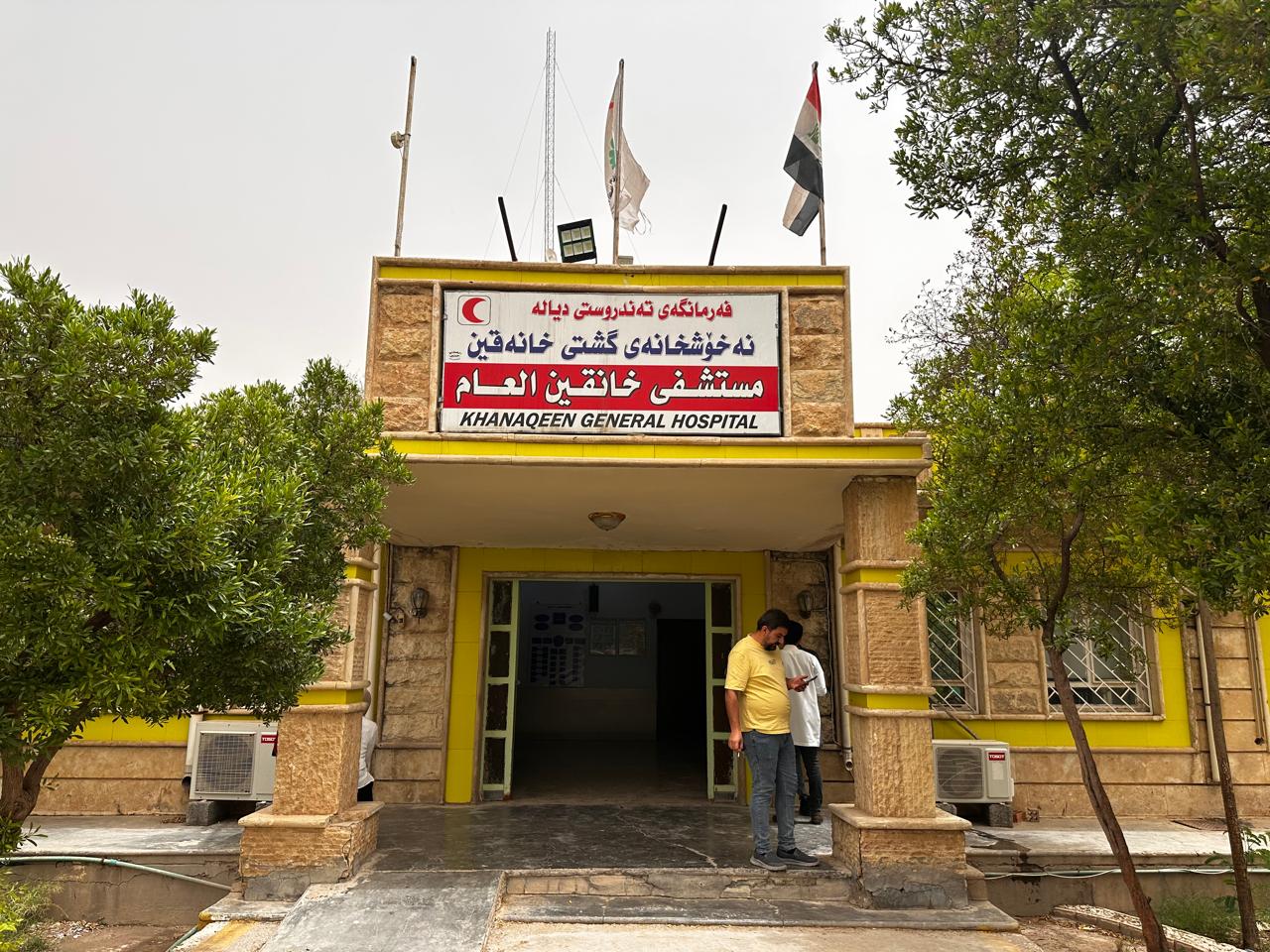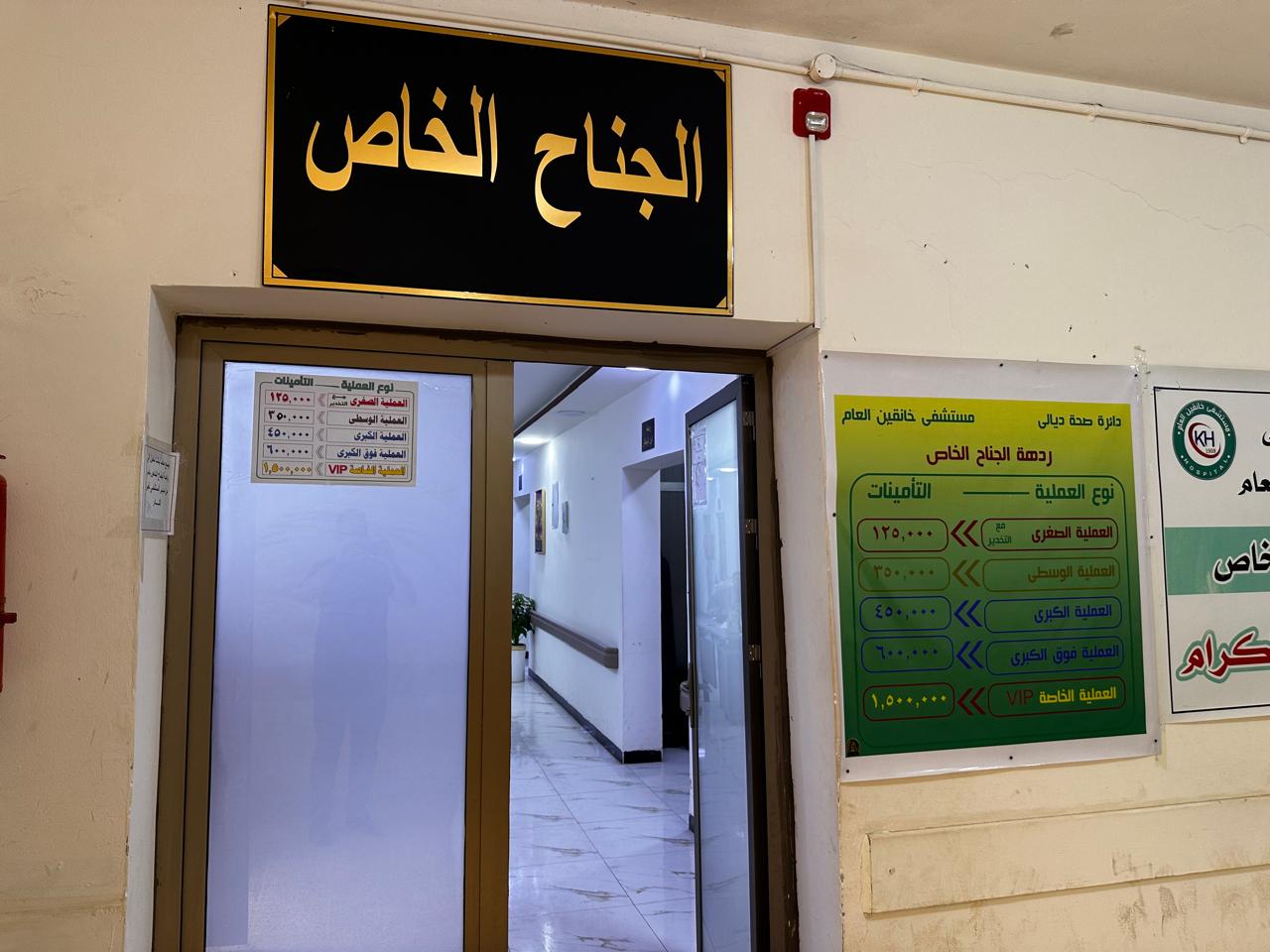Gynecology and obstetrics clinics in Khanaqin are extremely crowded with pregnant women who wait in line for hours to receive care for themselves and their children, even though the same services are available free of charge at public hospitals.
Shadan Mohammed, 22, who gave birth to her baby in a private hospital a few weeks ago, says, “Most pregnant women do not trust the public sector, so they resort to private clinics and hospitals.”
Khanqin has a street called Doctors' Street, which is lined with private clinics, including many gynecologists and obstetricians.
Shadan, a mother of two who lives in Khanqin, went to Sulaymaniyah to give birth because she trusts the services there. She told KirkukNow, “Here, you have to go to a private hospital, and you have to visit it privately so that you can have surgery later in the government hospital.”
“The vast majority of pregnant women go to private clinics to monitor their babies and their health because they are well monitored and guided, but at the Khanaqin General Hospital, the doctor himself performs quick and urgent examinations,” she added.
“Besides, all the tests are not available at public hospitals.”
In Khanaqin, you are forced to go to a private hospital
The state provides services related to pregnant women, childbirth, and fetuses as part of family planning, within the pregnancy health package, in accordance with international quality standards and free of charge.
This responsibility of the state is part of the National Strategy for Family Planning and Reproduction 2021-2025 implemented by the Iraqi federal government.
Shiwan Shaker, director of Khanqin General Hospital, told KirkukNow that “all the necessary facilities and services are available for pregnant women. There is healthcare for pregnant women before and after childbirth.”
Family planning, as implemented in the Iraqi strategy, aims to increase the interval between births by at least two to three years by providing health services and contraceptives to improve maternal and child health, reduce mortality, combat poverty, and provide access to better education and health services.
“Most parents go to private clinics to protect their children because the doctors we see in hospitals and clinics behave very differently,” says Razhan Majid. “In general, doctors encourage patients to visit their private clinics.”
Majid, the father of a child in his mid-twenties, says that every family with a pregnant woman in Khanqin has to spend between 100,000 and 150,000 Iraqi dinars IQD (USD100) a month on doctor visits, medication, and tests.
In 2019, the Iraqi government allocated just 2.5% of the state’s $106.5 billion budget to its health ministry, while security forces received 18% and the oil ministry 13.5%. The same was true for 2014.
Over the past decade, data from the World Health Organization WHO shows, Iraq’s central government has consistently spent far less per capita on healthcare than its much poorer neighbors - $161 per citizen each year on average, compared to Jordan’s $304 and Lebanon’s $649, a report by Reuters found.

Not only is visiting the doctor a burden on citizens, but the price of a single visit ranges from 5,000 to 25,000 IQD, depending on the doctor's experience, and all medical equipment and medicines must be purchased at commercial prices from pharmacies.
The director of Khanqin General Hospital admitted that some doctors were referring pregnant patients to private hospitals for surgery, but after we learned of such cases, “I did not allow the manipulation of patients.”
Every pregnant woman must see a doctor regularly during the first nine months of pregnancy and thereafter according to a schedule to ensure her health and that of her baby.
“General practitioners intimidate women in the last weeks of pregnancy, prompting them to turn to the private sector or a private department in a public hospital, because they bear part of the cost of the operation,” Shadan Mohammed continued.
“During that period, women feel threatened and look for a reliable place to have the operation, regardless of the cost.”
Iraq’s healthcare system which was once one of the most advanced in the region now is in serious crisis. There’s a shortage of buildings, drugs and the medical staff to administer it. Over the past three decades the country has been ravaged by Iraqi-Iran war, Saddam Hussein’s invasion of Kuwait, ousting of Saddam regime followed by sectarian violence, the war against al-Qaeda and the rise of Islamic State in Iraq and Syria ISIS.
The political chaos after 2003, pushed an estimated 15,000 out of 52,000 registered Iraqi doctors to leave the country. The young student doctors primarily seek training and life abroad rather than permanent state employment.
People prefer to go to private clinics because of the perception that the public sector does not provide any medical services which is not true
A family planning clinic was opened at Khanqin Hospital years ago to provide awareness and guidance on public health, pregnancy, and birth spacing, but the number of women who visit it is limited.
Majid took his wife to a government hospital for a delivery, but in the private ward, which charges a fee, “the services are good...” unlike the public ward, which is free of charge.
“Once I bought medicine for my pregnant wife for 43,000 dinars, and I bought the same medicine from another place for 25,000 dinars.”
There are three different types of delivery at Khanqin General Hospital: natural birth, free cesarean, and a special section for surgical delivery, which costs between 450,000 to 650,000 IQD.
“The doctor decides whether the delivery will be natural or surgical, but in general, most pregnant women want to have surgery,” Shaker said.
The director of Khanqin General Hospital believes that despite providing services according to their capabilities, people prefer to go to private clinics because of the perception that the public sector does not provide any medical services which is not true.”
Last year, 898 deliveries were performed at Khanqin General Hospital, including 341 natural births, according to the hospital's official statistics provided to KirkukNow. However, the private hospital refused to disclose any information about its statistics.






